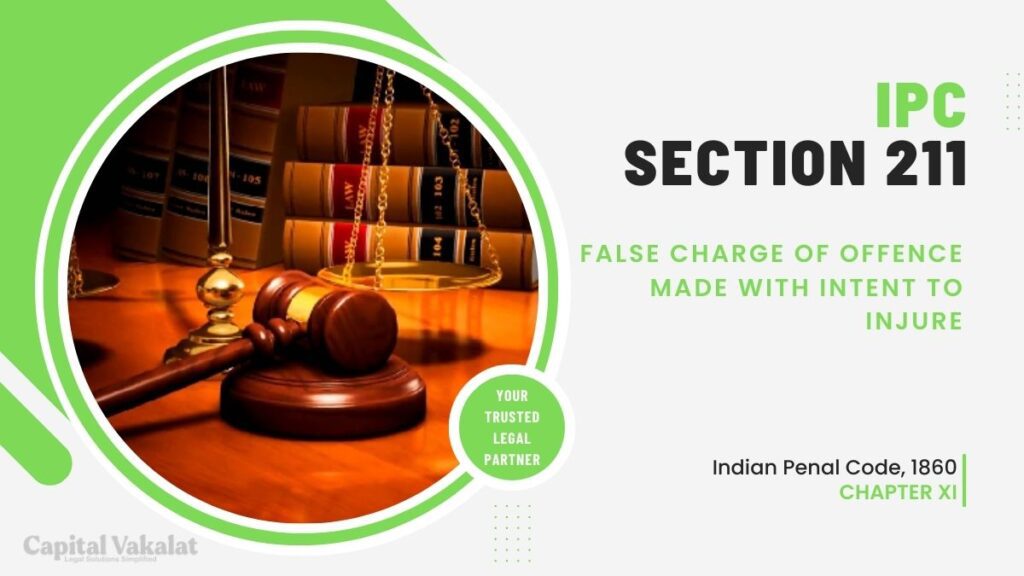In the realm of criminal law in India, Section 211 of the Indian Penal Code (IPC) deals with a serious offense – making a false charge of an offense with the intent to injure another person.

This article will delve into the intricacies of Section 211 IPC, its elements, consequences, and real-life examples, shedding light on the importance of upholding justice and preventing false accusations.
Introduction to Section 211 IPC
Section 211 of the IPC is a legal provision that seeks to punish individuals who knowingly and maliciously make false accusations against others. It serves as a safeguard against the misuse of the legal system to settle personal scores, tarnish reputations, or cause harm to innocent individuals.
Understanding False Charges and Their Implications
False charges, also known as false complaints, can lead to grave consequences for the accused. These charges not only damage a person’s reputation but can also result in legal proceedings, fines, and imprisonment, affecting their livelihood and personal life.
Elements of Section 211 IPC
To invoke Section 211 IPC, certain elements must be established:
- The accused must have made a charge against another person.
- The charge must be false.
- The accused must have known that the charge was false.
- The intent to injure or harm the reputation of the person against whom the charge is made must be present.
Intent to Injure: A Key Component
The presence of the ‘intent to injure’ is a crucial aspect of Section 211 IPC. This element distinguishes legitimate complaints from malicious false charges. Intent to injure implies a deliberate and malevolent motive behind making the false charge, with the aim of causing harm to the accused.
Legal Consequences of False Charges
Those found guilty under Section 211 IPC can face severe legal consequences, including imprisonment and fines. The penalty serves as a deterrent to discourage individuals from lodging false complaints against others, thus upholding the sanctity of the legal system.
Real-Life Case Studies
To better understand the gravity of false charges and their implications, let’s explore a few real-life case studies where individuals were convicted under Section 211 IPC due to their false accusations.
Case 1: Workplace False Accusation
In a corporate setting, an employee falsely accused a colleague of embezzlement with the intent to tarnish their reputation. The accuser was subsequently convicted under Section 211 IPC.
Case 2: Property Dispute
In a property dispute, a family member falsely alleged that their sibling had committed theft with the intent to claim the property for themselves. The accuser was found guilty under Section 211 IPC.
Protecting Yourself from False Charges
To protect yourself from false charges, it is essential to maintain a record of any contentious interactions, gather evidence when possible, and consult with legal counsel if you suspect that someone is making false accusations against you. Timely action can be critical in defending your reputation and rights.
Reporting False Charges
If you find yourself a victim of false charges, it is crucial to report the matter to the authorities promptly. The legal system can only function efficiently when such instances are brought to light and justice is sought.
The Role of Police and Investigation
The police play a pivotal role in investigating false charges and determining whether there is merit to the accusations. Their impartiality and dedication to uncover the truth are vital in maintaining the integrity of the legal system.
Conclusion: Upholding Justice
Section 211 IPC stands as a deterrent against the misuse of legal mechanisms for personal vendettas. It reinforces the importance of honesty and integrity in legal proceedings, aiming to uphold justice and protect the innocent. In a society where trust in the legal system is paramount, the provision acts as a safeguard against false accusations.
Frequently Asked Questions
What is the typical punishment for those convicted under Section 211 IPC?
The punishment can vary but often includes imprisonment and fines, depending on the seriousness of the false accusation.
Are false charges a common issue in India’s legal system?
While false charges do occur, the legal system aims to address and penalize such instances to maintain its integrity.
How can I protect myself from potential false charges in personal or professional disputes?
Maintaining records, gathering evidence, and seeking legal advice can help protect your interests in such situations.
What role do lawyers play in cases involving Section 211 IPC?
Lawyers are essential in defending the accused and ensuring that their rights are protected during legal proceedings related to false charges.